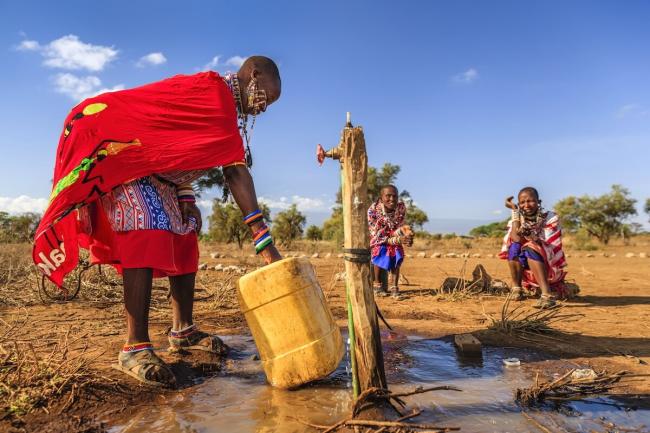Articles Menu

Oct. 18, 2024
If there is one natural resource that all life on Earth depends on, it’s water.
In a new report, The Economics of Water: Valuing the Hydrological Cycle as a Global Common Good, the Global Commission on the Economics of Water warns that, unless water resources are urgently conserved and the destruction of ecosystems is stopped, more than half the world’s food production will be at risk of failing within the next quarter century.
“The world faces a growing water disaster. For the first time in human history, the hydrological cycle is out of balance, undermining an equitable and sustainable future for all,” the authors of the report’s executive summary wrote. “Decades of collective mismanagement and undervaluation of water around the world have damaged our freshwater and land ecosystems and allowed for the continuing contamination of water resources. We can no longer count on freshwater availability for our collective future.”
Water scarcity already impacts half the global population, according to the report, and the climate crisis will only make it worse, The Guardian reported.
By 2030, freshwater demand will exceed supply by 40 percent.
The amount of water necessary for people to have adequate nutrition, good health and hygiene has been greatly underestimated by experts and governments, the report said. Because the necessary volume of water — approximately 4,000 liters per day — can’t be found locally in most regions, people depend on trade to provide it.
Earth’s atmospheric rivers transport moisture around the planet, and some nations benefit more from “green water” — soil moisture needed for food production — than the “blue water” that is found in lakes and rivers.
“Our policies, and the science and economics that underpin them, have also overlooked a critical freshwater resource, the ‘green water’ in our soils and plant life, which ultimately circulates through the atmosphere and generates around half the rainfall we receive on land,” the executive summary said.
The vegetation from nearby land use generates from 40 to 60 percent of freshwater rainfall that then puts water back into Earth’s atmosphere through transpiration, generating clouds that move downwind.
“The Chinese economy depends on sustainable forest management in Ukraine, Kazakhstan and the Baltic region,” said professor Johan Rockström, Potsdam Institute for Climate Impact Research’s director and co-chair of the commission, as reported by The Guardian. “You can make the same case for Brazil supplying fresh water to Argentina. This interconnectedness just shows that we have to place fresh water in the global economy as a global common good.”
Organized in the Netherlands in 2022, the Global Commission on the Economics of Water utilizes the work of leading economists and scientists in forming its review of the state and management of the planet’s hydrological systems.
For every degree Celsius of global temperature increase, seven percent more moisture is added to the atmosphere, which enhances the hydrological cycle.
“Most gravely, while itself a victim of climate change, the degradation of freshwater ecosystems including the loss of moisture in the soil has become a driver of climate change and biodiversity loss. The result is more frequent and increasingly severe droughts, floods, heatwaves, and wildfires, playing out across the globe,” the executive summary said. “Nearly 3 billion people and more than half of the world’s food production are now in areas where total water storage is projected to decline.”
Razing forests and draining wetlands also disrupts the globe’s water cycle, which is dependent upon water storage in soils and transpiration from trees.
“Water is victim number one of the [climate crisis], the environmental changes we see now aggregating at the global level, putting the entire stability of earth’s systems at risk,” Rockström told the Guardian. “[The climate crisis] manifests itself first and foremost in droughts and floods. When you think of heatwaves and fires, the really hard impacts are via moisture — in the case of fires, [global heating] first dries out landscapes so that they burn.”

The report said developing countries need to be given access to financing for safe water and sanitation, the overhaul of water systems and halting the destruction of biodiversity and ecosystems.
Co-chair of the commission Mariana Mazzucato, a University College London professor of economics, said public sector bank loans made to developing countries should be contingent on water reforms.
“These could be improving water conservation and the efficiency of water use, or direct investment for water-intensive industries,” Mazzucato said, as The Guardian reported. “[We must ensure] profits are reinvested in productive activity such as research and development around water issues.”
The report also found that water scarcity had a disproportionate impact on women and children.
“More than 1,000 children under five die every day from illnesses caused by unsafe water and sanitation. Women and girls spend 200 million hours each day collecting and hauling water,” the executive summary said.
The report emphasized that there was still hope if we take immediate action.
“We can fix this crisis if we act more collectively, and with greater urgency. Vitally too, restoring stability of the water cycle is critical not only in its own right, but to avoid failing on climate change and safeguarding all the earth’s ecosystems, as well as on each and every one of the Sustainable Development Goals (SDGs). It will preserve food security, keep economies and job opportunities growing, and ensure a just and liveable future for everyone,” the authors said in the executive summary.
[Top photo: A woman from the Maasai tribe collects water in Kenya, Africa to carry back to the village. hadynyah / E+ / Getty Images]